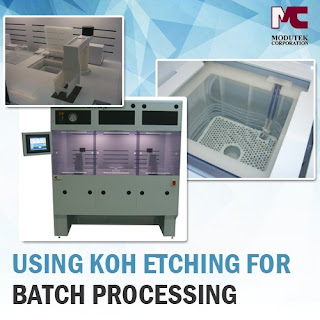Etching
baths with varying concentrations of potassium hydroxide (KOH) and controlled
temperatures are used to create microscopic structures on silicon wafers.
Semiconductor manufacturing and research facilities usual prefer the KOH etching process because it provides controlled and
uniform etching results with a high degree of precision. In addition, it’s also
comparatively safe.
The silicon
surface is masked to enable etching and the creation of cavities in specific
areas, based on the layout of the final semiconductor product. The etch rate
can be precisely controlled by adjusting the bath temperature and the levels of
KOH. The KOH etching is also influenced by the following:
·
The presence of atomic defects in the
silicon crystal
·
The lattice planes of the crystalline silicon
·
Boron doping of the silicon
·
Natural impurities
The
oriention of the lattice planes in a particular direction can also influence
and control the direction of the etching and the shape of the cavities created
in silicon. Also boron doping can be used to stop etching in a specific
direction. These along with the mask are factors that permit the creation of
cavities in required shapes and orientations.
The
advantages of KOH etching include:
·
Safe
·
Easy to handle
·
Rapid etching
·
Excellent reproductivity
·
Cost-effective
·
Provides high precision when process
variables are strictly controlled
Modutek’s KOH Etching process equipment
includes PFA Teflon tanks, circulation and filtering systems as well as
cassette handling equipment. Modutek also provides customized equipment for a
particular application, by size, capacities,
and controls. These may include the KOH processing tank, the recirculating system, and the silicon wafer handling. Modutek
uses the latest state-of-the-art technology to provide high accuracy and
exceptional output quality.
For more
details read the complete article titled “Using KOH Etching
for Batch Processing” and and contact Modutek if you have questions or would like to
discuss your particular application requirements.


No comments:
Post a Comment